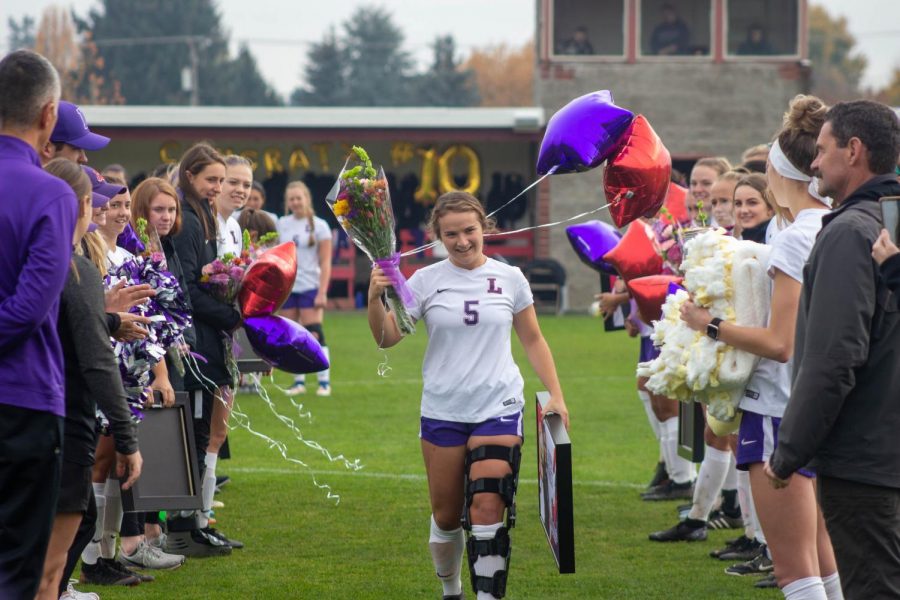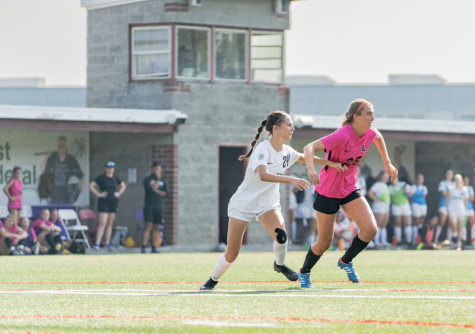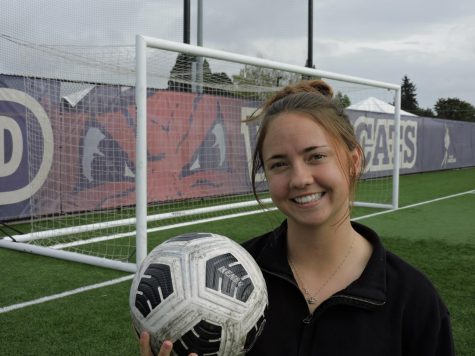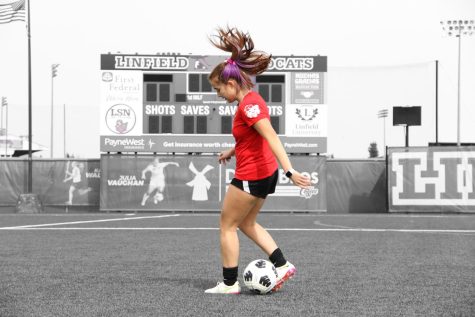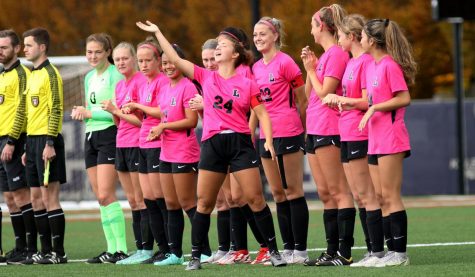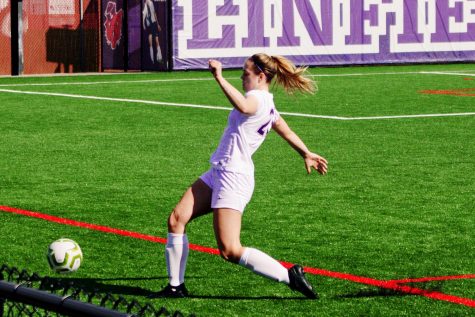The moment, the pop and the end
Senior Lauren Frost walking down the field for her final soccer game at Linfield College.
Lauren Frost slows her feet as she goes up to defend the ball.
Sensing the opposing player is about to change direction, she plants her foot and twists. Her knee hyperextends and she immediately hears a pop.
Frost finds finds herself lying on the field in a fetal position. She lets out a scream and assistant coach Julia Vaughan-Howard responds.
“Why am I not crying,” she says. “I’m in a lot of pain. Why am I not crying.”
“Oh, you’re in shock you’re in shock,” Vaugh-Howard replies.
After a bit, Frost recovers from the initial shock and the tears begin to flow. Still lying on the field, emotions begin to well up.
Through all the pain, Frost keeps asking herself, “Why?”
A senior, she only had five more weeks left in her competitive career. That has her thinking, “I sure didn’t want to go out this way.”
Frost is an athletic training major, so knew instantly what that pop meant. She had suffered a tear in the anterior cruciate ligament in her knee, commonly known as the ACL.
The tear occurs when you plant your foot abruptly, she said, slamming a fist into an open hand to demonstrate, then you almost simultaneous twist your body to change direction. The twisting force force the joint open and that stretches the ACL past its limits.
That’s when it pops, she said, repeatedly twisting her fist in her hand to illustrate.
A torn ACL is a season-ending injury that often requires reconstructive surgery. It can take six to nine months to return to full activity and sometimes a year to return to peak performance.
“I remember being a little confused,” fellow senior and athletic training major Mary Cait Moriarty said as she rushed over to see what all the commotion was about, “because usually, when something happens, Lauren and I both would go. I was like, ‘Where’s Lauren?’ Then it clicked that she was the one on the ground.”
Frost had never before suffered any injury she couldn’t play through.
Her first thought was, “What the hell’s with my body. I’m 21 years old and it just now decides to do this to me, five weeks before I’m done with competitive sport?”
The lights bathed the turf, as it was around 8 at night. Her teammates rolled Frost to her back and carried her over to the benches along the sideline.
Her head coach Steve Simmons wrapped her knee up and ended practice.
“That first night was kind of eye opening,” Frost said. “Luckily, it was a Thursday and Grey’s Anatomy was on. Three of my friends came over and we kind of just watched Grey’s rather than think about what just happened.”
She had been playing soccer since the age of 5, giving her a 16-year run.
A few days later, she received confirmation from Dr. Derek Rains, who works with Linfield’s athletic program, that it was a torn ACL. Her surgery is set for early January and in the meantime has set out on the long road of rehabbing her knee.
Being a really active person who realized she couldn’t engage in normal activities for up to nine months was one of the hardest parts. That meant no skiing or golf. In fact, she couldn’t even do something as instinctual as running over to get a ball.
She said her injury even kept her from routine actions like walking up stairs. One day, it hurt so bad she broke out in tears — not only because of the pain, but also because of all the limitations she faced.
“One you realize that, as somebody who’s an athlete, you ask yourself, ‘What am I doing?”’
But even though Frost is relegated to crutches right now, she’s not going to let it deter her mentality.
“I was like, ‘Alright now. You’re going to be the same hype man you’ve always been,'” she said. “’You’re going to be the same teammate that you’ve always been, but now in a different role.’”
Some days it’s hard to go to practice and cheer her customary 90% of the time, due to the pain. But Frost still does every single one of her pregame handshakes with her teammates, even though some had to be modified, because she can’t jump.
“Every game day, I’m still hyped to go out there and see my girls play,” she said.

